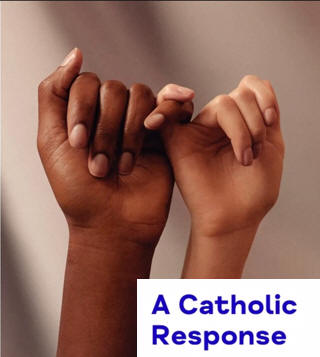Catholic Medical Quarterly Volume 71(3) August 2021
Reports
Healthcare at the Margins:
the CMA(UK) annual conference
Our Annual Conference this year, again via Zoom, was really excellent.
 First
we heard about the work of the Jesuit Refugee Service (JRS) Nicholas
Hanrahan from the JRS told us that the JRS works in 51 countries and seeks
to work in education, emergency assistance, healthcare, livelihood and
social services. At present they work in East London, near Heathrow and
also now in a centre in Kent..
First
we heard about the work of the Jesuit Refugee Service (JRS) Nicholas
Hanrahan from the JRS told us that the JRS works in 51 countries and seeks
to work in education, emergency assistance, healthcare, livelihood and
social services. At present they work in East London, near Heathrow and
also now in a centre in Kent..
This started really with Vietnamese Boat people in 1980. St Ignatius asked us to go anywhere where we are most needed, for the greater service of God. (Pedro Arrupe SJ Nov 1980)
And the JRS seeks to meet both temporal and spiritual needs of the refugees. One of the most valuable things that we can offer refugees is our presence. Values of the JRS are to service, accompany, give hope and be compassionate.
They work with destitute asylum seekers who have no support from the Government.
Since the pandemic many activities have been moved online and the JRS has started taking the work on the road, delivering food etc to the needy.
The JRS works in 2 centres near Heathrow which have capacity for 2000 people to be held indefinitely. Refugees have a great fear of being charged for medical care, as they do not have recourse to NHS funding for non urgent care. And bills for urgent care sometimes appear months later which makes things worse.
Refugees often have great trauma from past experiences and struggle to navigate destitution, stress, anxiety and depression, as well as exhaustion and ongoing uncertainty over their immigration status. Many have chronic conditions which make things worse still. So the migrants are a very vulnerable group. Some have no place to stay at night and sleep on night-buses, in homeless shelters and on the streets. They are vulnerable to infection, physical and sexual assault, with poor diet, food poisoning with poor diets, and worsened problems when people were required self isolate during the pandemic. And, of course, Covid does infect the vulnerable more often. Detention brings with it extreme anxiety, and depression, self harming and suicidal thoughts, loss of appetite and insomnia. Many are taken into detention during dawn raids etc and that too can be very traumatising. And there is a real lack of support after discharge into the community.
Our refugee friends’ experience the toughest thing about being destitute? Not having a place to shower or to clean your teeth or to take good care of yourself. It’s humiliating when you see someone, even a friend, turn you away because you’ve not been able to wash yourself or your clothes for the last couple of days. It’s not easy.
As one refugee aid “everyone becomes sick”.
‘The night buses feel safer than the streets”.
JRS provide pastoral and emotional support and also help registering with GPs. They will support referrals to other services and also support mothers with sourcing baby needs. Refugees also suffered significantly from vaccine hesitancy. So they have collaborated with vaccine centres etc to support that work. Pope Francis speaks of the need to reach out to and help refugees and that is a very important issue for us all.
Mental Health in Marginalised Groups:
Paul Farmer CEO of Mind
Our second session was from Paul Farmer, the Chief Executive Officer of Mind. He told us that there is much poor mental health among the marginalised and the protective factors for positive mental health are really important, such as family, friends, colleagues and home along with food, warmth and other key things.
As protective factors are eroded, mental health deteriorates. During the pandemic the loss of opportunity along with the removal of protective factors have been very important. Those working in settings such a ICUs and on the front line generally have been really crucial. People, especially when they are ill and self isolating, become less able to adapt. But the pandemic has been particularly tough for people with existing mental health problems.
And people of racialised communities have an increased risk of poor mental health and also of detention under the Mental Health Act. Young men from racialised communities are 11 times more likely to have psychosis than young white men. Black people have higher rates. of psychotic disorder, depression panic disorder and PTSD.
Asian people are more likely to have PTSD and panic disorder. And people from different communities access care and understand mental health illness in different ways. BAME communities access mental health treatment less than other communities. Although, interestingly, BAME children are still significantly less likely to have mental health problems than white children.
 A
Catholic response sees a comprehensive mental health strategy that creates
an open and supportive environment.
A
Catholic response sees a comprehensive mental health strategy that creates
an open and supportive environment.
- Promote well-being within the parish
- Connecting theology and life
- And supporting parishioners with mental health problems.
In summary
As with so many CMA events, this conference was really excellent and thought provoking. We are the Church of the poor, the vulnerable and the weak. We have much to do, but our faith can lead us towards it.
